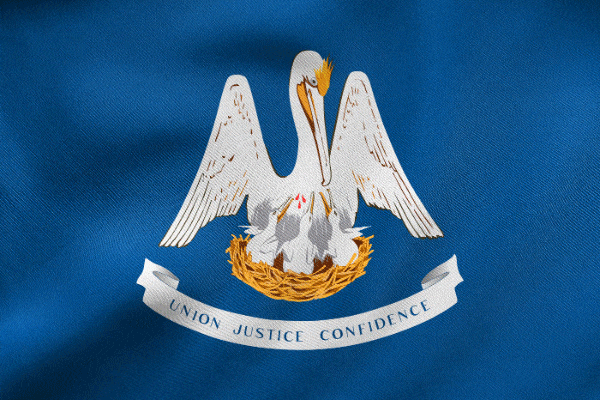Louisiana
State abbreviation/Postal code: La./LA Governor: John Bel Edwards, D (to Jan. 2020) Lieut. Governor: Billy Nungesser, R (to Jan. 2020) Senators: John Neely Kennedy, R (to Jan. 2023); Bill Cassidy, R (to Jan. 2021) Historical biographies of Congressional members Secy. of State: Tom Schedler, R (to Jan. 2020) Treasurer: John Neely Kennedy, R (to Jan. 2020) Atty. General: Jeff Landry, R (to Jan. 2020) Organized as territory: March 26, 1804 Entered Union (rank): April 30, 1812 (18) Present constitution adopted: 1974 Motto: Union, justice, and confidence
Nickname: Pelican State Origin of name: In honor of Louis XIV of France 10 largest cities (2012): New Orleans, 369,250; Baton Rouge, 230,058; Shreveport, 201,867; Metairie, 138,481; Lafayette, 122,761; Lake Charles, 73,474; Kenner, 66,820; Bossier City, 64,655; Monroe, 49,156; Alexandria, 48,367. Land area: 43,562 sq mi. (112,826 sq km) Geographic center: In Avoyelles Parish, 3 mi. SE of Marksville Number of parishes (counties): 64 Largest parish by population and area: Orleans, 343,829 (2010); Vernon, 1,328 sq mi. State forests: 1 (8,000 ac.) State parks: 35 Residents: Louisianan, Louisianian 2013 resident population: 4,670,724 2010 resident census population (rank): 4,533,372 (25). Male: 2,219,292 (48.4%); Female: 2,314,080 (51.6%). White: 2,836,192 (62.6%); Black: 1,452,396 (32.0%); American Indian: 30,579 (0.7%); Asian: 70,132 (1.5%); Other race: 69,227 (1.4%); Two or more races: 72,883 (1.6%); Hispanic/Latino: 192,560 (4.2%). 2000 population 18 and over: 3,415,357; 65 and over: 557,857; median age: 35.8. |
Louisiana has a rich, colorful historical background. Early Spanish explorers were Alvárez Piñeda, 1519; Álvar Núñez Cabeza de Vaca, 1528; and Hernando de Soto in 1541. Sieur de la Salle reached the mouth of the Mississippi and claimed all the land drained by it and its tributaries for Louis XIV of France in 1682.
Louisiana became a French crown colony in 1731 but was ceded to Spain in 1763 after the French and Indian Wars. (The portion east of the Mississippi came under British control in 1764.) Louisiana reverted to France in 1800 and was sold by Napoleon to the U.S. in 1803. The southern part, known as the territory of Orleans, became the state of Louisiana in 1812.
During the Civil War, Louisiana joined the Confederacy, but New Orleans was captured by Union Adm. David Farragut in April 1862. The state's economy suffered during Reconstruction; however, the situation improved at the turn of the 20th century, with the discovery of oil and natural gas and the growth of industry.
Louisiana is a leader in natural gas, salt, petroleum, and sulfur production. Much of the oil and sulfur comes from offshore deposits. The state also produces large crops of sweet potatoes, rice, sugar cane, pecans, soybeans, corn, and cotton. Leading manufactured items include chemicals, processed food, petroleum and coal products, paper, lumber and wood products, transportation equipment, and apparel.
The state has become a popular tourist destination. New Orleans is the major draw, known particularly for its picturesque French Quarter and the annual Mardi Gras celebration, held since 1838.
Other major points of interest include the Superdome in New Orleans, historic plantation homes near Natchitoches and New Iberia, Cajun country in the Mississippi Delta Region, Chalmette National Historic Park, and the state capital at Baton Rouge.
On Aug. 29, 2005, Louisiana was hit by Hurricane Katrina, devastating New Orleans, and killing hundreds elsewhere in the state, particularly in the parishes of Jefferson and St. Bernard. Federal and local officials were widely criticized for their slow and inadequate response to the initial disaster and subsequent recovery programs.
See more on Louisiana:
Encyclopedia: Louisiana
Encyclopedia: Geography
Encyclopedia: Economy
Encyclopedia: Government
Encyclopedia: History
Monthly Temperature Extremes
All U.S. States: Geography & Climate
Printable Outline Maps
Record Highest Temperatures
Record Lowest Temperatures
Highest, Lowest, and Mean Elevations
Land and Water Area
All U.S. States: Population & Economy
Historical Population Statistics, 1790–Present
Per Capita Personal Income
Minimum Wage Rates
State Taxes
Federal Government Expenditure
Percent of People in Poverty
Births and Birth Rates
Homeownership
Percentage of Uninsured by State
All U.S. States: Society & Culture:
Most Livable States
Healthiest States
Most Dangerous States
Smartest States
Crime Index
Residency Requirements for Voting
Compulsory School Attendance Laws
Driving Laws
National Public Radio Stations
Selected famous natives and residents:
- Louis Armstrong musician;
- Geoffrey Beene fashion designer;
- Truman Capote writer;
- Kitty Carlisle singer and actress;
- Van Cliburn concert pianist;
- Harry Connick, Jr. singer;
- Michael De Bakey heart surgeon;
- Fats Domino musician;
- Ellen DeGeneres comedienne, actress;
- Donna Douglas actress;
- Louis Moreau Gottschalk pianist and composer;
- Bryant Gumbel TV newscaster;
- Lillian Hellman playwright;
- Al Hirt trumpeter;
- Mahalia Jackson gospel singer;
- Jean Laffite privateer;
- Dorothy Lamour actress;
- John A. Lejeune Marine Corps general;
- Elmore Leonard author;
- Jerry Lee Lewis singer;
- Huey P. Long politician;
- Wynton Marsalis musician;
- Jelly Roll Morton jazz musician and composer;
- Huey Newton black activist;
- Marguerite Piazza soprano;
- Paul Prudhomme chef;
- Anne Rice novelist;
- Howard K. Smith TV commentator;
- Britney Spears singer;
- Ben Turpin comedian;
- Madame C. J. Walker entrepeneur;
- Ray Walston actor;
- Edward Douglas White jurist.
- Reese Witherspoon actress;


